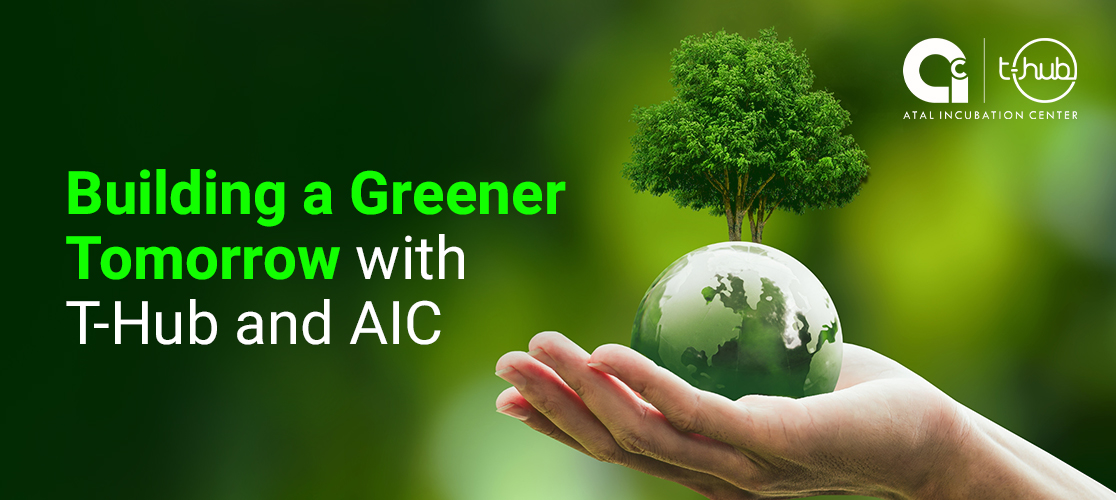
Atal Incubator at T-Hub Ignites the Surge of Indian Startups to Global prominence
A supportive entrepreneurial ecosystem acts as an alchemist, moulding raw potential into success. Incubators, mentors, investors, and collaborators are vital in guiding startups through challenges. Enter India, a hub entrepreneurial spirit, where the Atal Innovation Mission (AIM) by the Indian Government has ignited innovation.
- World-class Innovation Hubs
- Grand Challenges
- Start-ups
- Self-Employment Activities

A Brief History and Challenges of the Government
In 2019, government spending on healthcare in India amounted to $36 billion, constituting 1.23% of the GDP. However, in 2020–21, India allocated 1.8% of its GDP to health. Beyond healthcare, India plays a crucial role in global agriculture, providing livelihoods for about 55% of its population. Additionally, it stands as the fourth-largest electricity consumer globally and the third-largest producer of renewable energy, with 40% of the installed capacity sourced from renewable sources in 2022. Despite challenges, India maintains a total literacy rate of 77.70%, a significant achievement attained over a prolonged period.
To bridge the gap between academia and industry, AICs actively engage in collaborations with universities and research institutions, transforming research into commercially viable ventures. These partnerships connect startups with mentors, who provide invaluable guidance and expertise.
AICs’ Comprehensive Impact on Entrepreneurial Growth

A robust support system forms the backbone of AICs, offering co-working spaces, state-of-the-art prototyping facilities, financial assistance, and expert mentorship across diverse sectors. This comprehensive assistance spans every stage of a startup’s journey, from ideation to scaling, encompassing specialized incubation programs, acceleration initiatives, skill-development workshops, and networking events. Telangana’s thriving entrepreneurial ecosystem, exemplified by centres, such as T-Hub in Hyderabad and Atal Incubation Centre (AIC T-Hub), focuses on specific sectors such as IT, Mobility, Semiconductors, Healthcare, Emerging technologies, Agriculture, and Food processing, amplifying the impact of innovation and entrepreneurship in the region.
Beyond providing physical resources, AIC empowers startups with holistic guidance, offering mentorship, networking opportunities, skill development, and crucial access to funding. Recognizing that startups require seed funding, grants, and access to investor networks for sustained growth, AIC facilitates government funds, corporate sponsorships, and strategic partnerships. This multifaceted support not only nurtures startups but also contributes significantly to job creation, fostering an innovation culture, bridging academia-industry gaps, and empowering underprivileged communities.
AIM’s Vision for Entrepreneurial Excellence in India Through Network of AICs
With a record of accomplishment of supporting over 3,500 startups, creating 32,000 jobs, incubating more than 2,900 startups, and facilitating over ₹1,000 crore in funding, AICs demonstrate their pivotal role in shaping a vibrant entrepreneurial landscape. Notably, the focus on supporting women-led startups underscores AICs’ commitment to inclusivity and diversity, marking a key aspect of their impact on the startup ecosystem.
Cultivating Entrepreneurial Habits:
- AIC’s mission centres on cultivating entrepreneurial habits that includes . promoting problem-solving mindsets, resilience, risk-taking, strong work ethics, continuous learning, and network building. This focus not only shapes businesses but fosters a community of innovative individuals.
- Expanding AIC’s tech landscape:
India’s tech landscape reflects diverse innovations, from AI-powered healthcare diagnoses to smart-city infrastructure, ushering in a transformative shift. With 15 new AICs established across India, their reach expands, fostering innovative ideas in diverse regions and creating a robust network of 75 operational AICs nationwide.
- Funding and Investments:
- AIM’s emphasis on funding and investment, with ₹350 crore earmarked for incubated startups, plays a pivotal role in nurturing startups towards growth.
Pioneering Solutions Across Industries:
- In healthcare, AICs pioneer solutions for telemedicine, remote diagnostics, and personalized healthcare. Agriculture-focused AICs drive advancements in precision farming, Agri-Tech solutions, and sustainable agricultural practices.
Role of Cleantech:
- Cleantech AICs contribute significantly to developing renewable energy resources, waste management solutions, and environmental sustainability initiatives.
The Global Effect:
- International collaborations form a crucial part of AIM’s strategy, fostering global learning and best practices exchange through partnerships with leading incubators and organizations.
Power of Collaborations:
- Joint programs and initiatives support international startups entering the Indian market, providing global mentorship, and networking opportunities for AIC-backed ventures.
Events and Conventions:
Several AICs actively organize events like hackathons, conferences, and investor pitching sessions, complemented by new initiatives in intellectual property protection, market access, and business development.
Building a Greener Tomorrow with T-Hub & AIC
Amidst the urgent challenges posed by climate change, resource depletion and pollution, prioritising sustainability becomes imperative. Sustainability, which incorporates environmental, social and economic dimensions, guarantees that we satisfy current requirements without affecting future generations.
Every individual, enterprise and governmental body bears responsibility for forging a more environmentally friendly future, where we preserve a flourishing planet for posterity. In this global endeavour, India emerges as a responsible contributor with T-Hub and AIC taking the lead. These entities act as catalysts, accelerating the development and deployment of circular economy solutions, for a greener tomorrow.

Global waste generation is projected to rise to 46 billion tonnes by the year 2050. with only a fraction currently undergoing effective recycling. To address these challenges, investment in infrastructure, heightened public awareness and incentivisation of responsible waste management practices are imperative.
Climate change, marked by a current global average temperature increase of 1.1°C from pre- industrial levels and anticipated to escalate further, poses a grave danger. Resource depletion, which is growing at an alarming rate with material consumption tripling since 1970 and projected to double by 2050, exerts significant pressure on vital resources. This unsustainable model is compounded by widespread pollution, evident in the staggering accumulation of an estimated 19-23 million tonnes of plastic waste leaks in the oceans annually. Maximising resource efficiency through a circular economy
The circular economy advocates for the maximisation of resource use by prolonging the useful life of products and by recycling materials. The approach contrasts sharply with the linea model, emphasising the following key principles:
- Reuse: Extending the lifespan of existing products through repair, refurbishment or repurposing.
- Recycle: Transforming waste materials into new products to establish a closed-loop system.
- Refurbishment: Restoring used products to a condition.
- Re-manufacturing: Disassembling used products to recover materials for creating new ones.
- Composting: Converting organic waste into nutrient-rich soil amendment.
- Advancing sustainable practices
By adhering to these principles, the circular economy presents several significant advantages:
Reduced Environmental Impact: Through waste minimisation and reduced resource extraction, the circular economy contributes to climate change mitigation, biodiversity conservation and pollution reduction.
Enhanced Resource Efficiency: By promoting the efficient use of resources, the circular economy extends their lifespan and decreases the necessity for new material extraction.
Stimulated Economic Growth: Innovation and new business opportunities, particularly in repair, refurbishment and recycling sectors, are fostered by the circular economy. Recycling Waste Efficient waste management stands as a cornerstone of the circular economy.
Through the segregation of waste at its source and the establishment of robust recycling systems, we can significantly mitigate the volume of materials destined for landfills. Segregation: The process of separating various types of waste at the point of origin, such as paper, plastic, glass and metal, facilitates streamlined recycling and ensures material purity. The worldwide plastic recycling market, which recorded a value of USD48.9 billion in 2022, is forecast to reach a revised figure of USD 86.7 billion by 2030.

The market demon strates strong growth, exhibiting a notable compound annual growth rate (CAGR) of 7.4 per cent from 2022 to 2030.
Recycling: Recycling entails the transformation of waste materials into new products, establishing a closed-loop system and diminishing the reliance on virgin resources. For instance, recycling one aluminum can will conserve enough energy to power a television for three days or is equivalent to i.8 litre of gasoline. Moving to a circular economy
Given India’s expanding population and increasing resource use, adopting the principles of a circular economy is essential for a more circular economy, The National Mission on Sustainable Habitat (NMSH) seeks to advocate sustainable urban development practices, encompassing efficient waste management and resource use.
- The Swachh Bharat Mission (Clean India Mission) concentrates on enhancing sanitation and waste management nationwide, emphasising waste segregation and treatment.
- The Promotion of Resource Efficiency- The Indian government promotes resource efficiency through initiatives, such as the Perform, Achieve and Trade (PAT) scheme, which provides incentives to industries for reducing their energy consumption.
T-Hub, renowned as India’s premier innovation hub, plays a pivotal role in nurturing startups dedicated to advancing the principles of a circular economy. Through initiatives like the AIC Sustainability Program, T-Hub facilitates the access to mentorship, funding and networking opportunities for startups, fostering the development and scalability of innovative solutions. With a funding of INR 250 lakhs, T-Hub helps develop solutions in waste management, renewable energy, and sustainable agriculture. In this way, impactful businesses contribute to the establishment of a circular economy.
AIC (Atal Innovation Mission), an initiative by the Government of India, focuses on fostering innovation and entrepreneurship across various sectors, with a special emphasis on sustainability. Through collaborations with innovation hubs, such as T-Hub, AIC extends crucial support to startups engaged in circular economy solutions. The support includes provision of incubation space, funding opportunities and access to industry expertise. Such collaborative endeavors expedite the progress and implementation of circular economy solutions.
Transitioning to a circular economy model demands collective efforts from governments, businesses and individuals. It offers a transformative approach to resource management, providing a pathway towards a more sustainable future for India. Leveraging the combined efforts of government initiatives, innovative hubs and individual contributions, India can accelerate its transition towards sustainable practices.

